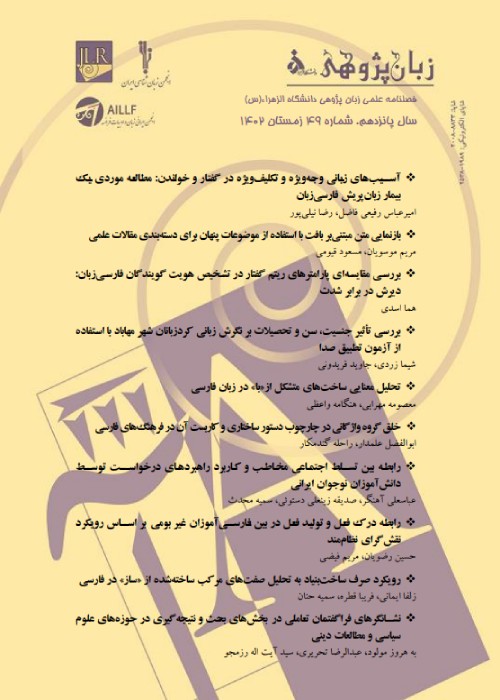The relationship between reading skills and syntactic and lexical abilities in dyslexic and normal Persian-speaking children
Reading is one of the most valuable skills of the human being. This complex behavior is composed of several distinct and separable subskills. Furthermore, different theories of reading methods have been proposed and each language has a different paradigm depending on its writing system. Apparently, the most common method among these is the one-to-one correspondence between phoneme and grapheme. However, this method has some drawbacks. According to Ahri and Snowling (2004), if the sequential decoding strategy is slow and inefficient it overloads the memory leading to inaccurate pronunciation and lack of associative meaning. As a result of repeated exposure to printed words, children's knowledge of spelling patterns is expanded to facilitate its retrieval of meaning. To clarify the role of decoding in reading and reading disability, a simple model of reading is proposed. According to the Simple View (Gough & Tunmer, 1986), reading ability can result from the combination of decoding and comprehension. In this view, reading comprehension is conceptualized as the product of two interrelated -but relatively independent- cognitive processes, that are, decoding (or word recognition) and listening comprehension (or language comprehension). Both of them are necessary cognitive components, and neither alone is sufficient for successful reading comprehension. In addition to word recognition problems, many reading-disabled individuals were found to have impaired reading comprehension. Although the central role of phonological deficits in word recognition difficulties has been widely demonstrated, the role of language abilities in the reading profile of dyslexic individuals has not been fully captured. Dyslexia, also known as specific reading disability, has been defined as one of several distinct learning disabilities that reading performance is markedly below what is expected in normally achieving readers (Siegel, 1992). In some studies, the existence of lexical problems in dyslexic children has been investigated. It has been shown that the level of lexical and semantic ability of children affects their reading comprehension. For example, some have explained that the breadth and depth of children's lexical knowledge affect their ability to recognize words. Additionally, there is evidence that has consistently established a strong association between language competence and reading abilities. In particular, oral vocabulary (measured with an oral receptive/expressive measure or a word definition measure) and semantic skills (measured with a synonym judgment task) were found to be concurrent and longitudinal predictors of word recognition and reading comprehension. Further contribution of oral vocabulary and semantic skills on reading comprehension in these studies provide clear support for the position that reading comprehension involves language comprehension beyond word recognition. Likewise, there are several studies about effective factors in reading. Some believe that vocabulary and syntactic ability play an important role in children's reading ability. There is also evidence that language skills such as syntactic complexity and lexical skills in 2 and 3-years old children are important predictors of their reading accuracy and comprehension in the future. Most of the research about the factors that affect reading has been in English. Hence, because of the different clarity in the orthography of different languages (from transparent to opaque languages), it is necessary to investigate these children in different languages. The present study aims to convey the relationship between reading skills and syntactic and lexical abilities in dyslexic and normal Persian-speaking children. For conducting this research, after issuing necessary licenses, primary school children with dyslexia were identified by referring to learning disorder schools in Tehran. After evaluating and diagnosing the dyslexic children by a psychologist and a speech therapist, 16 dyslexic students were selected. The Syntax Comprehension Test, Grammar Expression Test, vocabulary subtest of TOLD 3:P, and the reading test were then performed in different sessions. The results of the tests were recorded and the data were analyzed using the SPSS statistical package. According to the results of the present study, there is a significant difference in reading skills and syntactic and lexical abilities between dyslexic and normal Persian-speaking children. The results show that there is no significant correlation between reading skills and syntactic abilities. However, regarding lexical abilities in the dyslexic group, there is a significant correlation between the picture vocabulary and speed and accuracy of reading, between relational vocabulary and speed of reading, and also between oral vocabulary and reading accuracy and text comprehension (p <0.05). Moreover, there is a significant correlation between reading irregular words and two other tasks (picture vocabulary and oral vocabulary), but there is no significant correlation between reading non-words and oral vocabulary, and picture vocabulary and relational vocabulary. Therefore, strengthening the lexical ability of dyslexic children, in addition to improving their reading skill's accuracy and fluency, is essential for reading words especially irregular words.
- حق عضویت دریافتی صرف حمایت از نشریات عضو و نگهداری، تکمیل و توسعه مگیران میشود.
- پرداخت حق اشتراک و دانلود مقالات اجازه بازنشر آن در سایر رسانههای چاپی و دیجیتال را به کاربر نمیدهد.


